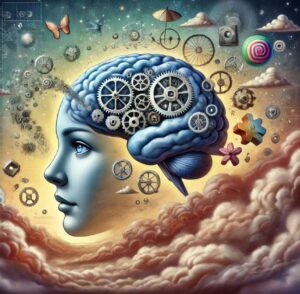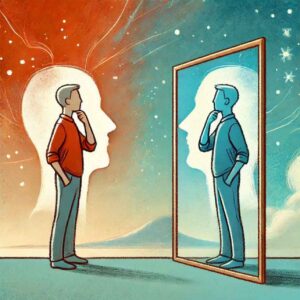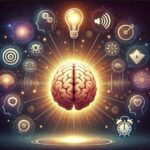
The Mind Games Your Brain Plays
What cognitive biases list do you know dramatically affects how we all think? Have you ever thought about how your brain tricks you? Do you remember the TV comedy-drama series, “Ally McBeal”? It was a show about a quirky lawyer and her colleagues, who often had bizarre thoughts, fantasies, and hallucinations. Some of them were so transparent that others could read their minds. At the same time, some were so weird that they made you wonder what was happening in their heads.
Well, this article is not about the show. It is about the science of how your brain tricks you. Sometimes, your brain can deceive you in ways you don’t even notice, which affects your perception and behavior. In this article, I will explain some theories about how your brain plays mind games on you. Don’t worry; it does not mean you are inexplicable. It just means that you are human, and your brain is an intriguing and intricate organ. So, let’s dive into the surprising and fascinating world of your brain!
We all have cognitive biases that distort our perception of reality and influence our decision-making. These biases are mental shortcuts our brains operate to facilitate the tricky and uncertain world. They help us make sense of the information we encounter but also lead us to errors and illusions.
Today, you will learn some of the most common and harmful cognitive biases that affect our beliefs. Also, you will learn strategies to overcome them and become more rational and objective thinkers.
Confirmation Bias

One of the most pervasive and powerful cognitive biases is confirmation bias. The inclination to pursue, analyze, and memorize information confirms our existing beliefs and opinions—in comparison, ignoring or rejecting information that contradicts them.
For example, if you believe vaccines are harmful, you are likelier to pay attention to stories supporting this view. More likely, you will disregard or dismiss those who challenge it.
⚠️ Confirmation bias can lead us to form and maintain false or biased beliefs, even when there is overwhelming evidence against them. It can also make us overconfident in our judgments and resistant to changing our minds when we encounter new or conflicting information.
✅ To overcome confirmation bias, we need to be aware of our assumptions and preferences and actively seek out different perspectives and sources of information. Moreover, we should be open-minded and willing to revise our beliefs based on new evidence rather than clinging to them for emotional or ideological reasons.
Availability Heuristic

Another typical mind bias is the availability heuristic. It is the tendency to judge the commonness or possibility of an occurrence based on how easily we can recall examples from our memory.
For instance, if you can think of many successful entrepreneurs who dropped out of college, you might underestimate the value of formal education for achieving success, even though most entrepreneurs have a college degree.
⚠️ It can direct us to produce inaccurate judgments based on vivid or memorable examples rather than reliable statistics or facts. It can also make us susceptible to media influence and sensationalism, as we tend to remember and believe what we see or hear more often or intensely.
✅ To deal with this, we should know how memory works and how external factors influence it. Also, we should seek objective and reliable data and evidence rather than relying on our intuition or anecdotal stories.
Anchoring Effect

A third cognitive bias that affects our thinking is the anchoring effect. It is the tendency to rely too much on the first piece of information we receive when making decisions or judgments and adjust our subsequent estimates or opinions based on that initial anchor.
Suppose you are shopping for a car, and the salesperson tells you the sticker price is $30,000; you might use that as a reference point and negotiate down from there. But if the salesperson tells you that the sticker price is $40,000, you might pay more than you would have otherwise, even if you manage to get a discount.
⚠️ The anchoring effect can lead us to make poor decisions or judgments based on irrelevant or misleading information. It can also make us vulnerable to manipulation and persuasion by others who can influence our choices by setting anchors for us.
✅ To prevail over this, we need to know how our initial impressions can affect our subsequent evaluations. We should also avoid making hasty decisions based on limited information and seek out multiple sources and perspectives before concluding.
Conclusion

Altogether, these are just some of the many cognitive biases that can trick our brains into believing things that are not true. They are not signs of stupidity or irrationality. They are natural and universal human tendencies that help us cope with the complexity and uncertainty of life.
The good news is that we can learn to recognize and overcome these biases with practice and awareness. We can train our brains to become more critical and objective thinkers and question our assumptions and beliefs. Moreover, we can seek feedback and constructive criticism from others who can challenge and help us grow.
Thus, we can improve our understanding of ourselves and the world and make better decisions and judgments that benefit ourselves and others. Importantly, we can become more humble and curious and appreciate the diversity and richness of the human experience. Hence, we can enjoy the wonder and mystery of life without falling for the lies that our brains tell us.
I hope this article about cognitive biases list has helped you. If you have any questions or comments, feel free to leave them below. Thanks for reading, and I’ll see you at the next one!
Additional References:
Nikolopoulou, K. 2022, January 9. What is anchoring bias? | Definition & examples. Scribbr. https://www.scribbr.com/research-bias/anchoring-bias/
Scribbr Editors. 2021, October 13. What is the difference between availability bias vs confirmation bias? Scribbr. https://www.scribbr.com/frequently-asked-questions/what-is-the-difference-between-availability-bias-vs-confirmation-bias/
Ally McBeal. TV Series 1997–2002 – IMDb. https://www.imdb.com/title/tt0118254/



